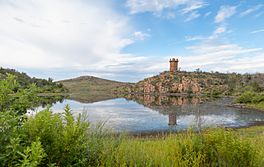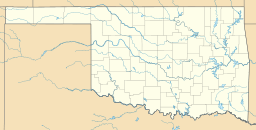Lake Jed Johnson facts for kids
Quick facts for kids Lake Jed Johnson |
|
|---|---|
 |
|
| Location | Wichita Mountains, Comanche County, Oklahoma, US |
| Coordinates | 34°43′45″N 98°36′0″W / 34.72917°N 98.60000°W |
| Type | reservoir |
| Primary inflows | Blue Beaver Creek |
| Primary outflows | Blue Beaver Creek |
| Catchment area | 5.35 sq mi (13.9 km2) |
| Basin countries | United States |
| Managing agency | U.S. Fish and Wildlife Service |
| Built | 1940 |
| Surface area | 57.5 acres (23.3 ha) |
| Water volume | 1,190 acre⋅ft (0.00147 km3) |
| Surface elevation | 1,608 feet (490 m) |
| Settlements | Cache, Medicine Park, Meers |
Lake Jed Johnson is a beautiful lake in southwestern Oklahoma. It is one of thirteen small man-made lakes, called reservoirs, in the Wichita Mountains National Wildlife Refuge. The lake is named after Jed Johnson (1888–1963), who was an important politician.
The city of Lawton, Oklahoma, which is the fourth largest city in Oklahoma, is the closest big town to the lake. Smaller towns like Cache, Medicine Park, and Meers are located north of the lake.
About Lake Jed Johnson
Lake Jed Johnson was created in 1940. Workers built the Jed Johnson Dam, a concrete structure, across Blue Beaver Creek in Comanche County, Oklahoma. The lake covers an area of about 57.5 acres (233,000 m2).
The main reason for creating this lake was to protect the homes of wild animals and plants. You can visit the lake and use a boat ramp to get your boat onto the water. Fishing is allowed, but you can only use boats that are powered by hand or small boats less than 14 feet (4.3 m) long with trolling motors.
The area around the lake is home to many animals. You might see deer, elk, Longhorn cattle, and bison. The refuge offers many fun activities like boating, fishing, hunting, and hiking.
Jed Johnson Tower and Trail
The Jed Johnson Tower stands on a hill near the lake. This tower was built in 1941 by the Civilian Conservation Corps (CCC). The CCC was a group of young men who worked on important projects across the country during the Great Depression. The tower was originally used to watch for fires.
Today, the tower is no longer used and is not open to visitors. This is because it is considered unsafe. The tower is about 60 feet (18 m) tall.
You can reach the tower by hiking on the Jed Johnson Trail. This trail is about 1 mile (1.6 km) long and goes from the lake shore and back. It's a great place for hiking, walking, running, and enjoying nature. The trail goes up about 68 feet (21 m) in height. You can use the trail all year round. If you bring a dog, make sure it stays on a leash at all times.
 | Delilah Pierce |
 | Gordon Parks |
 | Augusta Savage |
 | Charles Ethan Porter |



